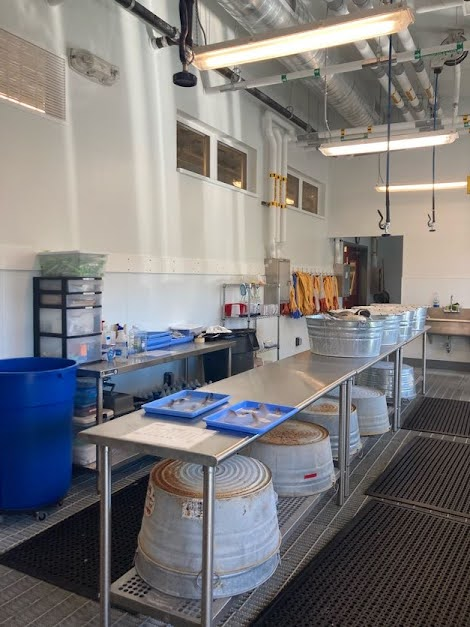A Visit to Tri-State Bird Rescue and Research
by Meaghan Lyon, Wildlife Biologist
When CWF biologists encounter an injured bird while doing field work, we usually turn to Tri-State Bird Rescue and Research for help. A recent visit to the Tri-State Bird Rescue and Research facility located in Newark, Delaware provided great insight into the efforts that go into ensuring that injured and oiled birds have a second chance in the wild. Their mission is to provide professional, compassionate rehabilitation to native injured and orphaned wild birds and contaminated wildlife, and to promote their stewardship through education and humane research.
The facility has two programs, the Wild Bird Clinic and Oiled Wildlife Response. With more than 40 years of experience, the Wild Bird Clinic provides expert medical care, housing, and diets to injured, orphaned, and oiled native wild birds.

The visit included an extensive tour of the Oiled Wildlife Response building which is separate from the other facilities to avoid re-contamination of oiled wildlife. The team has been responding to wildlife affected by oil spills since 1976. The response team is on-call 24 hours a day and responds to wildlife contaminated by oil spills throughout the entire East Coast. Tri-State is one of only a handful of organizations in the country that can professionally manage a response to a major spill.
Through the tour we learned that rehabilitation of oiled wildlife is a complex process, involving several steps to ensure the animals are washed clean of any oil. Upon arrival to the facility, the animals (primarily birds but they get reptiles and mammals too!) go through a medical screening and are provided care to make sure they will survive the cleaning process. After the animal is stabilized, they start the wash process which involves several tubs of water that is matched to the animals’ body temperature as well as hundreds of bottles of Dawn dish soap. Once they are completely clean of any oil, they next go to the drying room and finally back out onto the main floor where they await release. If an oiled bird still needs care after getting clean, they head next door to the Wild Bird Clinic.

Check out their release stories and videos here: https://tristatebird.org/gallery/release-videos/
If you are interested in donating to Tri-State Bird check out this link: https://tristatebird.org/get-involved/
Discover more from Conserve Wildlife Foundation of NJ
Subscribe to get the latest posts sent to your email.